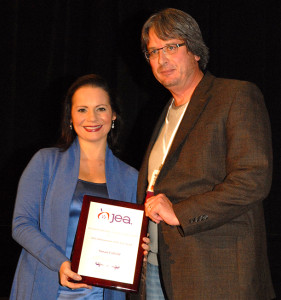The American Society of News Editors (ASNE) is pleased to sponsor the publication of the Principal’s Guide to Scholastic Journalism through the ASNE Youth Journalism Initiative. Supporting the development of strong student journalism programs at the secondary school level has never been more important.
The onset of the digital age forever changed the way all of us interact with news. More data is produced in a single second than can possibly be consumed in a lifetime. A student’s ability to use critical thinking to analyze the credibility of news reports and information sources and to differentiate among facts, opinions and assertions are essential 21st century skills. Scholastic journalism programs help students learn these news literacy skills while providing a valuable service to their school community.
Student publications foster community and encourage public debate on issues that matter to students. ASNE encourages students to aspire to journalistic excellence and the highest journalistic standards as found in ASNE’s Statement of Principles, which are summarized below:
- Responsibility. The primary purpose of gathering and distributing news and opinion is to serve the general welfare by informing the people and enabling them to make judgments on the issues of the time.
- Freedom of the Press. Freedom of the press belongs to the people. It must be defended against encroachment or assault from any quarter, public or private. Journalists must be constantly alert to see that the public’s business is conducted in public. They must be vigilant against all who would exploit the press for selfish purposes.
- Independence. Journalists must avoid impropriety and the appearance of impropriety as well as any conflict of interest or the appearance of conflict. They should neither accept anything nor pursue any activity that might compromise or seem to compromise their integrity.
- Truth and Accuracy. Good faith with the reader is the foundation of good journalism. Every effort must be made to assure that the news content is accurate, free from bias and in context, and that all sides are presented fairly.
- Impartiality. To be impartial does not require the press to be unquestioning or to refrain from editorial expression. Sound practice, however, demands a clear distinction for the reader between news reports and opinion.
- Fair Play. Journalists should respect the rights of people involved in the news, observe the common standards of decency, and stand accountable to the public for the fairness and accuracy of their news reports. Persons publicly accused should be given the earliest opportunity to respond.
The future of our communities and the future of our democracy depend on news literate citizens and well-trained journalists. We hope you find the Principal’s Guide to Scholastic Journalism a valuable resource in this endeavor.
Arnie Robbins
Executive Director
American Society of News Editors
209 Reynolds Journalism Institute
Columbia, Missouri 65211




